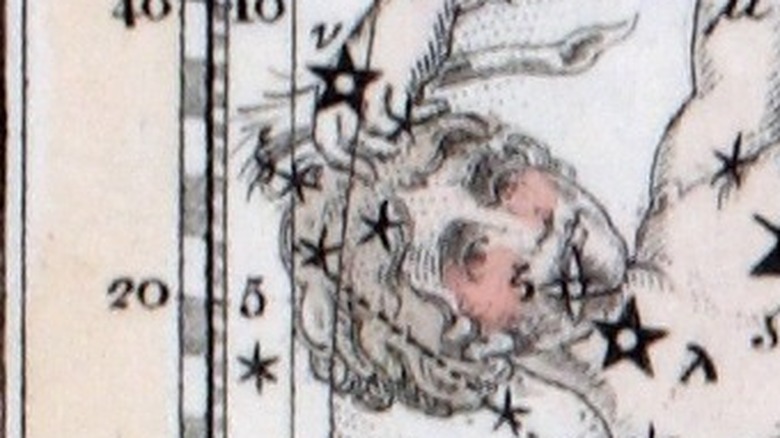The Myth Behind The Cassiopeia Constellation Explained
When it comes to mythology, hubris is a big part of the story. Per LitCharts, Icarus got too close to the sun with his makeshift wings and wound up plummeting back to Earth and drowning. Phaethon tried to be a charioteer in place of his father, Helios, and wound up dying from a lightning bolt from Zeus. Niobe lost her children because she bragged about them to a goddess. Gods don't like defiance or boasting at their expense.
That's the case with Cassiopeia. According to EarthSky, the Ethiopian queen bragged that she was as beautiful as the Nereids, Poseidon's companions. Since the Greeks idealized beauty, this meant that these Nereids were gorgeous. Poseidon did not like that slight and rather than discussing it with her, god to mortal, he sent a sea creature to destroy the coast of Ethiopia. She consulted an oracle who told her to sacrifice her daughter Andromeda to the creature. Apparently, an Edible Arrangement wouldn't work. So she had to put Andromeda out on a rock, chained up. It looked as though she was going to lose her daughter.
Then came Perseus. He was smitten with Andromeda and hastily got Cassiopeia's blessing to marry her before going and killing the monster. They were set to wed, but then Andromeda's uncle Phineus said he was the one who was supposed to wed her, according to Greek Legends and Myths. Perseus turned him to stone with Medusa's head, and they went off and had several grandchildren for Cassiopeia. Ultimately, Perseus, Andromeda, and Cassiopeia were immortalized in the night skies.
Cassiopeia's humiliation is evident for all to see
But the gods had one last bit of revenge left for Cassiopeia when they elevated her to the skies as a constellation.
It's said that revenge is a dish best served cold. There were times when the Greek gods agreed. While they didn't do something like make her eternally push a rock up a hill (like Sisyphus, per Britannica) and then have it roll back down, or have her tormented by birds plucking at her organs (like Prometheus, per World History), she did not get off easy. They were not satisfied with her almost seeing her daughter become a sacrificial snack for a sea creature and also having that creature nearly raze the coast of the homeland that she was in charge of. The gods were a fickle bunch, after all, and they showed it by making Cassiopeia be upside down part of the year in the skies — she would have to hang on to her chair to keep from falling off, according to EarthSky. Maybe she wishes she had kept her boasting to herself.
The lesson of many myths is to be humble and not do anything to anger the gods. Otherwise, you might wish that the worst fate for you was to spend part of the year hanging upside down while sitting in a chair in the night sky.

